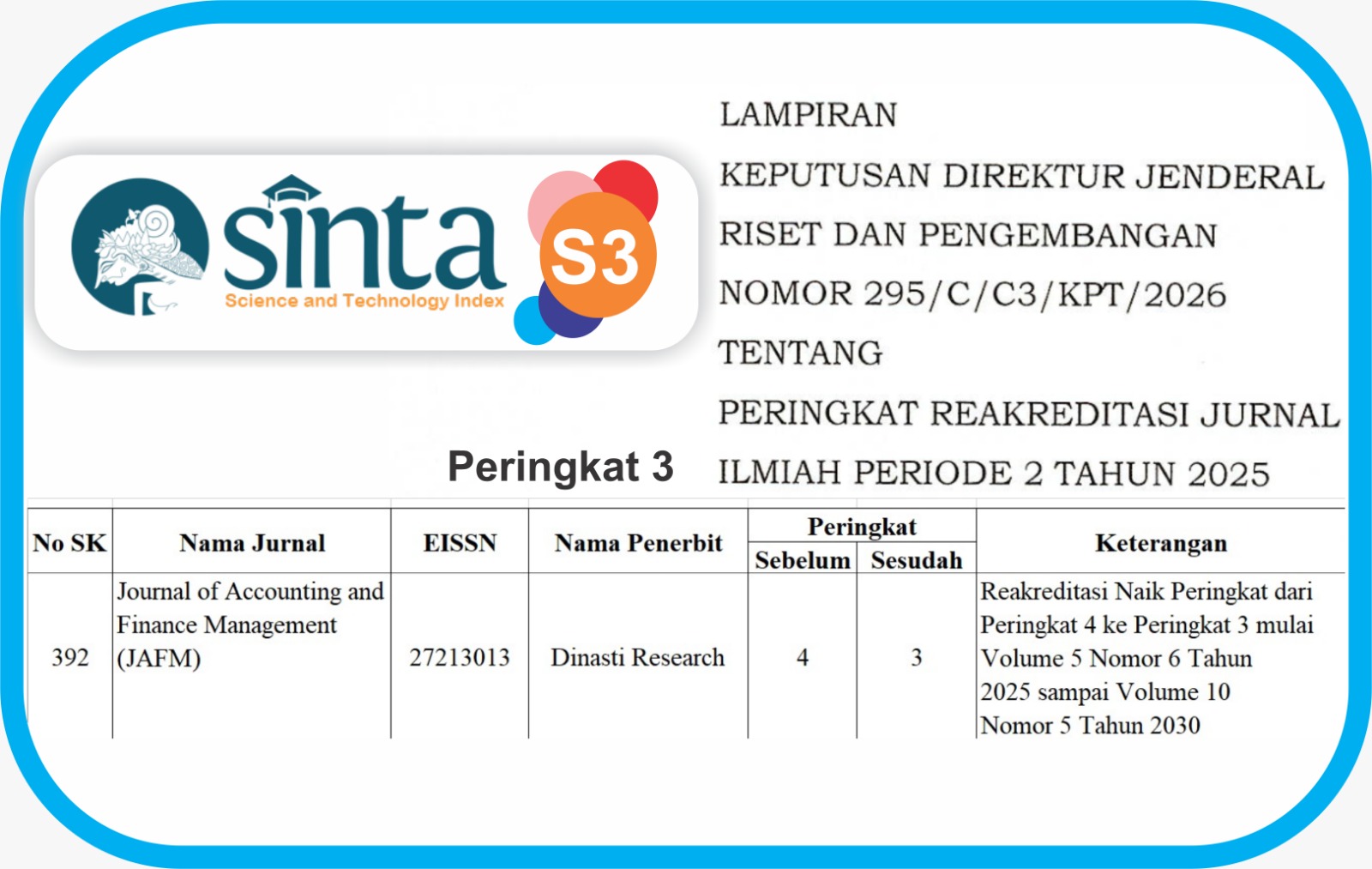Companies in Indonesia Towards the Implementation of Integrated Reporting
DOI:
https://doi.org/10.38035/jafm.v3i6.179Keywords:
Integrated Reporting, International Framework, LQ45, Annual Report, Sustainability ReportAbstract
Reports that not only disclose financial information, but also non-financial information that describes the company's overall activities present integrated information are known as integrated reporting. This research was conducted to find out whether companies in Indonesia are ready to switch to integrated reporting. The objects are the annual report and sustainability report of 16 companies from LQ45 listed on the IDX from 2017 to 2019. Data analysis techniques use content analysis based on the International <IR> Framework guidelines which focus on content elements. The results of the disclosure of the annual report and the sustainability report of 16 companies show that in general the companies have presented and disclosed the seven elements contained in the guidelines, namely the organizational overview and external environment, governance, business models, risks and opportunities, strategy and resource allocation, performance and outlook with an average value in the range of 3,563 – 4,958 from a maximum value of 5,00.
References
Abadi, Kumalawati, & Gunawan, Juniati (2015). Content Analysis Method: A Proposed Guideline for Quantative and Qualitative Disclosure.
Akisik, O. and Gal, G. (2019), "Integrated reportings, external assurance and financial performance: An empirical analysis on North American firms", Sustainability Accounting, Management and Policy Journal, Vol. 11 No. 2, pp. 317-350.
Febriyanti, A. F., & Gunawan, J. (2016). Analisis Luasnya Pengungkapan Kuantitatif Pada Integrated reporting Di Indonesia, Malaysia, Dan Singapura. Jurnal Magister Akuntansi Trisakti, 3(2), 147-168.
Feng, T., Cummings, L. and Tweedie, D. (2017), "Exploring integrated thinking in integrated reporting – an exploratory study in Australia", Journal of Intellectual Capital, Vol. 18 No. 2, pp. 330-353.
Freeman, R. Edward, Wicks, Andrew C., & Parmar, Bidhan. (2004) Stakeholder Theory and “The Corporate Objective Revisited”. Organization Science 15(3):364-369
Gobel, Fariz (2016).“Integrated reporting Solusi Atas Degradasi Bisnis Dan Tren Pelaporan Korporasi Di Masa Mendatang”. https://bursanom.com/pengertian-integrated-reporting/ (Diakses tanggal 1 Maret 2020)
Gunawan, Juniati, Djajadikerta, Hadrian, & Smith, Malcolm. (2009). an Examination of Corporate Social Disclosures in the Annual Reports of Indonesian Listed Companies.
Hall, James A. (2016). Accounting Information Systems. 9th edition. Pennsylvania: Cengage Learning.
Hsiao, P. and Kelly, M. (2018), "Investment considerations and impressions of integrated reporting: Evidence from Taiwan", Sustainability Accounting, Management and Policy Journal, Vol. 9 No. 1, pp. 2-28.
Jensen C. Michael C. Meckling H. William. (1976). Theory of the firm: Managerial behavior, agency costs and ownership structure. Journal of Financial Economics 3, 305-360.
Liu, Z., Jubb, C. and Abhayawansa, S. (2019), "Analysing and evaluating integrated reporting: Insights from applying a normative benchmark", Journal of Intellectual Capital, Vol. 20 No. 2, pp. 235-263.
Moleong, Lexy J. (2007). Metodologi Penelitian Kualitatif. Bandung: PT. Remaja Rosdakarya Offset.
Nazier, Daeng M. dan Indah Umiyati (2015). Transformasi Sustainability Reporting Menuju Integrated reporting (IR) Sebagai Cerminan Semakin Luasnya Akuntabilitas dalam Corporate Governance. Dimensia, Volume 12 Nomor 1 Maret 2015: 1-34.
Raar, J. (2002). Environmental Initiative: towards triple bottom line reporting. Corporate Communication, An International Journal , 7 (3), 166-83.
Scott, W.R. (2015). Financial Accounting Theory, 7th Edition, Prentice Hall.
Sulistyo-Basuki. (2006). Metode Penelitian. Jakarta: Wedatama Widya Sastra dan Fakultas Ilmu Pengetahuan Budaya Universitas Indonesia.
Umar, Sekaran. (2011). Research Method of Business. Jakarta: Salemba Empat.
Van Beurden, P., & Gossling, T. (2008). The worth of values—A literature review on the relation between corporate social and financial performance. Journal of Business Ethics, 82, 407–424.
Downloads
Published
How to Cite
Issue
Section
License
Authors who publish their manuscripts in this journal agree to the following conditions:
- The copyright on each article belongs to the author(s).
- The author acknowledges that the Journal of Accounting and Finance Management (JAFM) has the right to be the first to publish with a Creative Commons Attribution 4.0 International license (Attribution 4.0 International (CC BY 4.0).
- Authors can submit articles separately, arrange for the non-exclusive distribution of manuscripts that have been published in this journal into other versions (e.g., sent to the author's institutional repository, publication into books, etc.), by acknowledging that the manuscript has been published for the first time in the Journal of Accounting and Finance Management (JAFM).




























